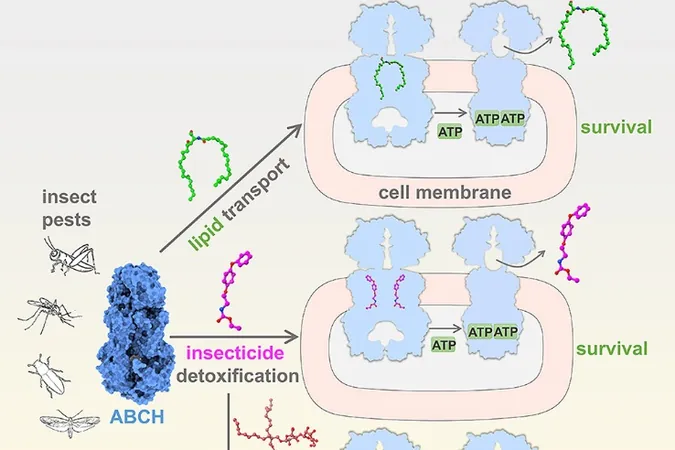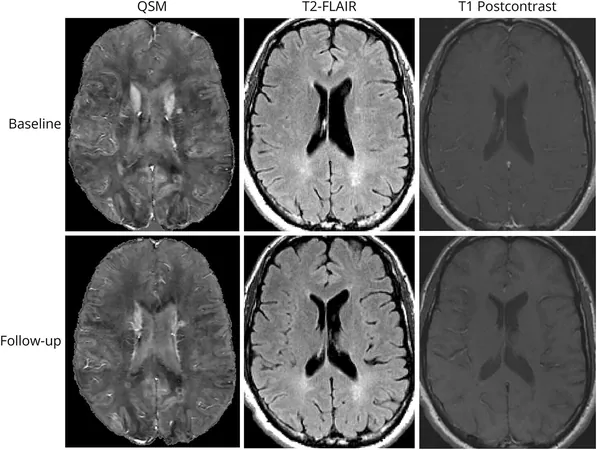
Revolutionary Discovery by Chinese Scientists Set to Transform the Pesticide Industry!
2024-12-26
Author: Wei
Groundbreaking Study Unveils Pivotal Advancement
In a groundbreaking study, Chinese scientists have unveiled a pivotal advancement in pest control technology, pinpointing a crucial protein utilized by insects for lipid transport and pesticide detoxification. This remarkable finding, published in the prestigious journal *Cell*, has the potential to revolutionize the pesticide market with the prospect of safer and more effective pest management strategies.
Focus on ABCH Transporters
The research, spearheaded by Professor Yang Qing of the Agricultural Genomics Institute in Shenzhen, focuses on a unique protein family known as ABCH transporters. These proteins are exclusively found in insects and are notably absent in humans and plants, making them an ideal target for developing innovative pesticides. ABCH transporters act as “squeeze pumps,” helping insects expel harmful substances, including pesticides, from their cells.
Identification of Small-Molecule Inhibitors
What sets this research apart is the identification of a small-molecule inhibitor that can effectively block these transporters. This inhibitory action could thwart insects’ ability to detoxify pesticides, significantly enhancing the lethal impact of these substances on harmful pests.
Urgency of Discovery
The urgency of this discovery is underscored by alarming statistics from the Food and Agriculture Organization of the United Nations, which reports that crop pests and diseases result in annual yield losses nearing 40%, leading to economic repercussions exceeding $220 billion. As pests threaten global food security, trade, and agricultural livelihoods, the need for eco-friendly and low-resistance pesticides has never been greater.
Targeting Molecular Mechanisms
Professor Yang emphasizes that the key to designing targeted pesticides—often dubbed "green pesticides"—lies in understanding and locating specific molecular targets that pesticides can exploit to disrupt pests’ biological functions. This strategic focus on molecular targets could reshape the pesticide industry into a more sustainable and efficient entity.
Support from Scientific Community
Prominent figures in the scientific community have hailed this study as a watershed moment in the quest for sustainable agriculture. Qian Xuhong, an academician at the Chinese Academy of Engineering, characterized the discovery as a “peak” achievement that could significantly propel the development of ABCH transporter-targeted pesticides. Similarly, fellow academician Song Baoan stressed the alarming rise of pesticide resistance as a pressing global challenge, asserting that this pioneering research equips us with essential insights and strategies to combat resistance.
Potential Benefits for Agricultural Sustainability
Kang Le, another esteemed academician from the Chinese Academy of Sciences, highlighted how this research could fundamentally benefit China’s agricultural sustainability. By isolating small-molecule inhibitors, this work lays the groundwork for creating novel pesticide solutions capable of addressing the ever-growing issue of pest resistance.
Future Prospects with AI
Looking to the future, Yang envisions substantial advancements spurred by artificial intelligence technologies. He anticipates that new pesticide products leveraging these groundbreaking findings could be realized within the next five to ten years, potentially reshaping global pest control practices and promoting practices that align with environmentally conscious agricultural development.
Conclusion: A New Era in Agriculture
Get ready for a new era in agriculture as Chinese scientists pave the way for the next generation of pesticides that could protect our crops and secure food supplies for generations to come!




 Brasil (PT)
Brasil (PT)
 Canada (EN)
Canada (EN)
 Chile (ES)
Chile (ES)
 España (ES)
España (ES)
 France (FR)
France (FR)
 Hong Kong (EN)
Hong Kong (EN)
 Italia (IT)
Italia (IT)
 日本 (JA)
日本 (JA)
 Magyarország (HU)
Magyarország (HU)
 Norge (NO)
Norge (NO)
 Polska (PL)
Polska (PL)
 Schweiz (DE)
Schweiz (DE)
 Singapore (EN)
Singapore (EN)
 Sverige (SV)
Sverige (SV)
 Suomi (FI)
Suomi (FI)
 Türkiye (TR)
Türkiye (TR)